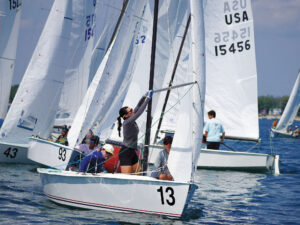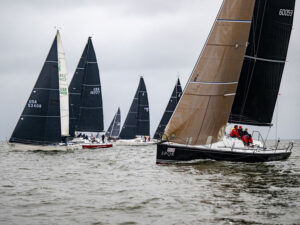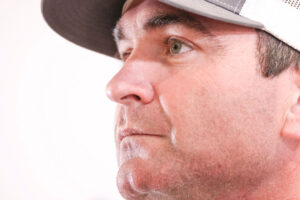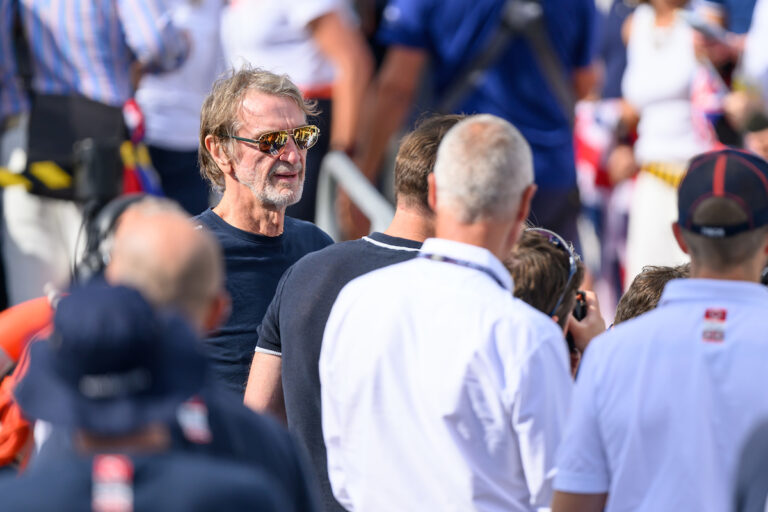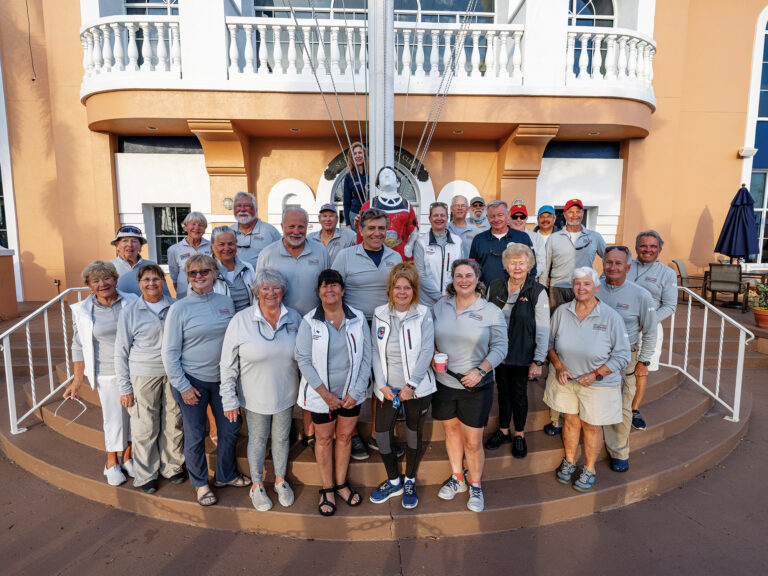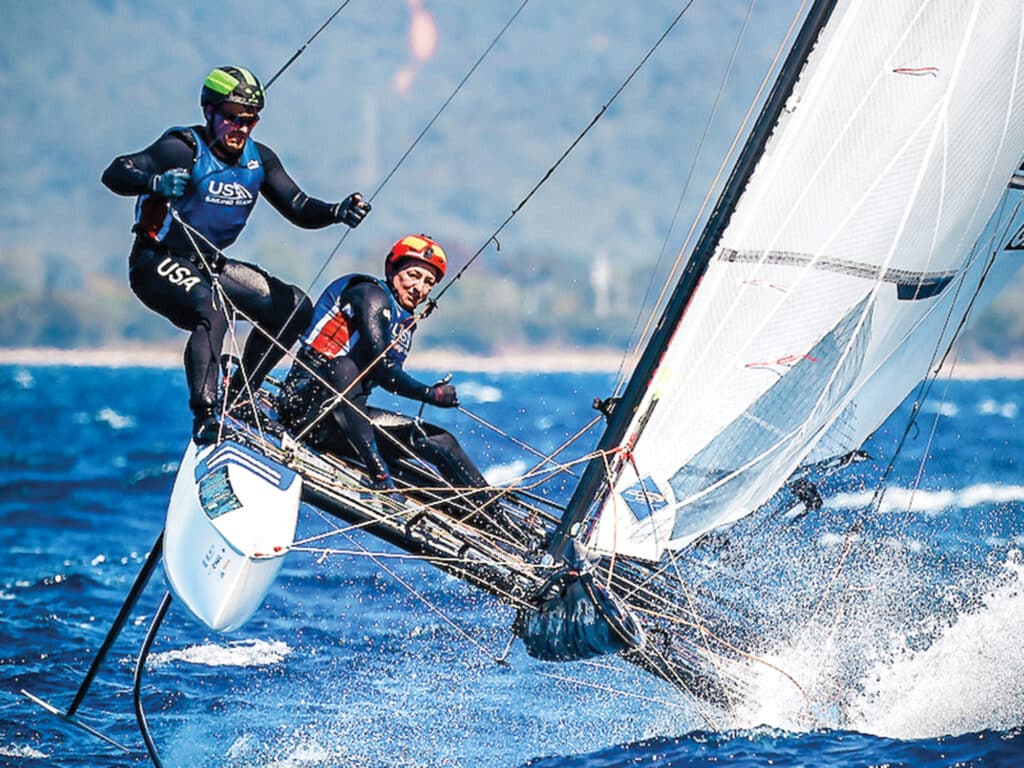
Sarah Newberry Moore’s son, Iren, just turned 2. Not only is he already wreaking havoc at the New York YC—scattering Goldfish crackers across the manicured lawn at Harbour Court and spilling his grandmother’s wine in the prestigious club library—but he’s also beginning to know his way around a Nacra 17 better than most adults.
Iren was, for all intents and purposes, born into the current Olympic quad, so it’s not surprising that he is quickly learning the ins and outs of elite sailboat racing, just as his mom and her sailing partner, David Liebenberg, have had to adapt to having a baby in the campaign mix. It’s an arrangement that is working out just fine.
“If you ask Iren what momma does, it’s ‘sailboat with Uncle Dave,’” Newberry Moore says with a smile. “Any time he sees a man with brown hair, he says, ‘Uncle Dave,’ and any man on a sailboat is Uncle Dave. Luckily, his dad looks very different. Dave has been showing him how to do boatwork, and he loves touching all of the parts of the boat and pulling on the lines.”
Raising a small child and training as an Olympic hopeful have several things in common: Each is an exhausting and challenging mission. Few US Sailing Team athletes vying for an Olympic spot in the current quad shoulder the additional responsibility of child-rearing: Stu McNay (Mixed 470) is a father of two (5 and 8), and Nikki Barnes (470) recently had her first baby. For Newberry Moore, the pandemic provided her with the time to determine that having a child was what she wanted in addition to continuing to race at the highest level of catamaran racing.
“The day I decided I wanted to have a child, we were in lockdown, the circuit was shut down, Dave and I weren’t sailing, although we had already planned to do another campaign,” she says. “There was no training or racing happening, and I realized if I didn’t do it then, I didn’t know when I would be able to. Dave was the first person I called. I said to him, ‘I think I want to have a baby,’ and he replied, ‘Ah, let’s talk about this later. I’ll call you back.’”
Newberry Moore acknowledges that from the beginning, Liebenberg found a way to support that process and believed in her ability to do all of the things related to motherhood and Olympic campaigning.
“It wasn’t a big surprise when she told me,” Liebenberg says. “I understood that it would help her develop as a person and an athlete. We’ve adjusted as a team with scheduling and so on; it really hasn’t been that big of a jump from my perspective, but more so for Sarah.”
Austrian Olympian Tom Zajak (bronze medalist in the Nacra 17 in Rio 2016) has known Newberry Moore since she won the Nacra 17 event at the Sailing World Cup Miami in 2013. He’s been coaching the pair since last summer and, as a dad himself who parented through an Olympic campaign, he understands the challenge.
“Sarah manages it really well,” Zajak says. “She needed time to find a good rhythm, and she has built up a good structure for her that is working really well; she is a role model for many sailors and athletes in many sports who are planning a family. What also works well for Sarah and Dave is that they have been sailing together for a long time; I think the glue that keeps them together is that they are quite different personalities, which is very important because the Nacra 17 is very demanding, and if you bring different skills to it, you have a bigger range of performance skills and approaches. It’s most important that they have a goal together to compete at the Olympics, and this is probably the biggest bonding they have—that makes them a strong team.”
Newberry Moore says she’s never been as good at what she does as she is now. It’s paramount to ensure that her valuable time is honored, both at home and in the boat park.
“I have become a far more focused person, and the time that has been eliminated is that time when you indulge yourself, whether it’s doubt or celebrating yourself,” she says. “My focus is either being a mom or being efficient with my time in the campaign. It’s also built my confidence as an athlete, as Dave can attest. This journey as a teammate and as an athlete inspired a deep level of self-confidence that I didn’t have before, where I started to advocate for what I needed and whatever the baby needed or wanted.”
Getting back on the boat after Iren’s birth was as much about getting her body back in shape for the intense workout the Nacra 17 demands as it was about the mental conditioning. “I may have looked whole, but coming in off the trapeze wire was an accomplishment,” Newberry Moore says. “I was the only one who knew what my core strength was, and the big goal each day was how smoothly I could get off the wire. My own internal journey was experiencing, ‘Cool! Good entry! You didn’t fall off the boat!’ It was so different to Dave’s reality.”
It didn’t help that the pair is campaigning the most difficult boat in the Olympic fleet. The Nacra 17 has been the equipment for the mixed multihull event since Rio 2016, the first time there was a mixed discipline. After Rio, the boat became a foiling catamaran. By 2020, the boats were foiling downwind, and for the 2024 quad, the boats are foiling upwind and downwind.
As the only US team actively campaigning a Nacra 17 currently, it has been virtually impossible for Newberry Moore and Liebenberg to train domestically and ride out the learning curve brought on by changes to the boat. The pair has had to train in Europe mostly, which has impacted routines related to traveling with a baby and training in a full-time program of some 200 days with early starts and late finishes.
“The boat is now much more challenging to sail,” Liebenberg says. “Downwind we would be pushing with intensity, but upwind we could take a breath and look around a lot easier. But now, in a lot of ways, it’s more difficult to sail upwind than downwind. We need to be much more fit; all of the alignment on the systems—the rudders and the rigging—matters a lot more. It’s been really exciting, a lot of fun, and a learning curve for the entire fleet, but it’s more boatwork and more time in the gym.”
Newberry Moore adds: “I think we were quick to adapt to upwind foiling. We had moments when we were going the same speed as top athletes—everybody was learning very quickly. It was like climbing a mountain that was growing. We’d figure something out, then see that someone else was doing it much better than we were. It was constant adaptation and required being very open-minded. You have to really like the process, often not having an answer and always being open to change. If you can enjoy that, then it’s a great boat to be sailing.”

